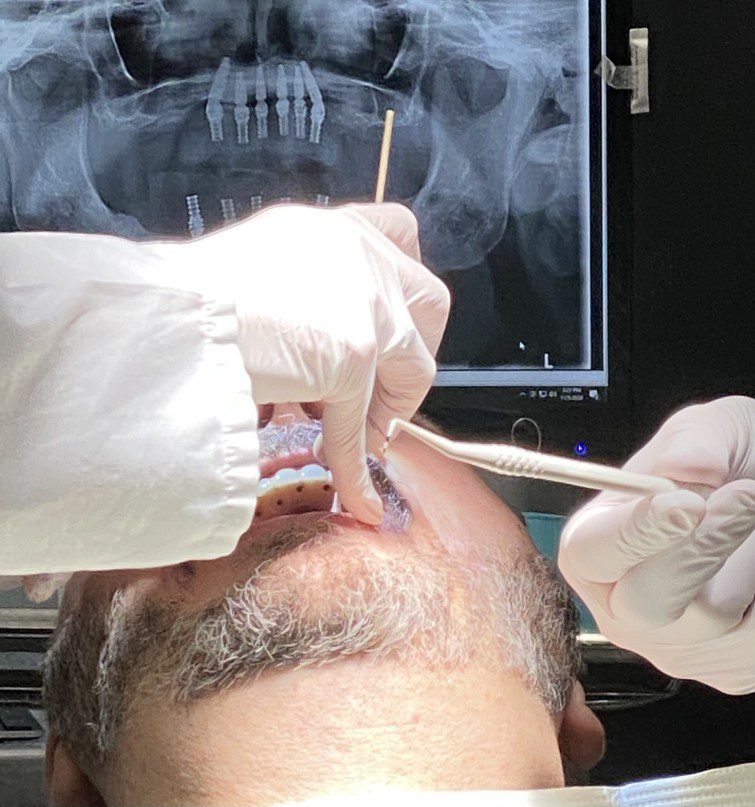Good oral hygiene is essential for keeping your teeth and gums healthy. Regular brushing and flossing, combined with regular visits to the dentist, can help prevent tooth decay, gum disease, and other oral health problems. In this article, we’ll discuss the basics of oral hygiene and how to keep your teeth and gums healthy. We’ll also discuss the importance of regular dental checkups and the benefits of preventive dental care. By following these tips, you can help ensure that your teeth and gums stay healthy for years to come.
The Importance of Brushing and Flossing: How to Maintain Good Oral Hygiene
Maintaining good oral hygiene is essential for overall health and wellbeing. Brushing and flossing are two of the most important steps to take to ensure your mouth stays healthy. Brushing and flossing are important for removing plaque, which is a sticky film of bacteria that builds up on teeth and gums. Plaque can lead to tooth decay, gum disease, and other oral health problems.
Brushing your teeth twice a day with a soft-bristled toothbrush and fluoride toothpaste is essential for removing plaque and keeping your teeth and gums healthy. It is important to brush for two minutes each time, paying special attention to the back teeth and gum line. It is also important to replace your toothbrush every three to four months or when the bristles become frayed.
Flossing is also important for removing plaque and debris between teeth and along the gum line. It is important to floss at least once a day, preferably at night before brushing. It is best to use a waxed dental floss to ensure the floss slides easily between teeth.
In addition to brushing and flossing, it is important to visit your dentist regularly for professional cleanings and checkups. Your dentist can identify any problems with your teeth and gums and provide treatment if necessary.
By following these steps, you can help maintain good oral hygiene and keep your teeth and gums healthy. Brushing and flossing are essential for removing plaque and preventing tooth decay and gum disease. Regular visits to the dentist are also important for maintaining good oral health.
The Benefits of Regular Dental Check-Ups: How to Prevent Dental Problems
Regular dental check-ups are an important part of maintaining good oral health. They can help to prevent dental problems and keep your teeth and gums healthy. Regular check-ups can also help to identify any potential problems before they become serious.
The most important benefit of regular dental check-ups is that they can help to prevent dental problems. During a check-up, your dentist will examine your teeth and gums for any signs of decay or infection. If any problems are identified, they can be treated quickly and effectively. This can help to prevent more serious issues from developing in the future.
Regular check-ups can also help to identify any potential problems before they become serious. Your dentist can spot any signs of decay or infection early on, which can be treated before it becomes a more serious issue. This can help to save you time and money in the long run.
Regular check-ups can also help to detect any oral health issues that may be related to other health conditions. For example, gum disease has been linked to heart disease, stroke, and diabetes. By detecting any signs of gum disease early on, your dentist can help to reduce your risk of developing these conditions.
Finally, regular check-ups can help to keep your teeth and gums healthy. Your dentist can provide advice on how to maintain good oral hygiene, such as brushing and flossing regularly. They can also provide advice on which products to use and how to use them correctly.
In order to get the most out of your regular dental check-ups, it is important to visit your dentist regularly. Most dentists recommend that you visit at least twice a year for a check-up and cleaning. This will help to ensure that any potential problems are identified and treated quickly.
By visiting your dentist regularly and following their advice, you can help to prevent dental problems and keep your teeth and gums healthy. Regular check-ups can also help to detect any potential problems before they become serious, saving you time and money in the long run.
The Role of Diet in Oral Health: Foods to Avoid and Foods to Include
Good oral health is essential for overall health and wellbeing. Diet plays an important role in maintaining oral health. Eating a balanced diet with the right combination of foods can help keep teeth and gums healthy and strong. On the other hand, certain foods can increase the risk of cavities and other oral health problems.
Foods to Avoid
Sugary and Sticky Foods: Sugary and sticky foods are the biggest culprits when it comes to cavities. Foods like candy, cookies, cakes, and other sweets are high in sugar and can stick to teeth, making them more vulnerable to decay. Starchy foods like chips and crackers can also stick to teeth and increase the risk of cavities.
Acidic Foods and Drinks: Acidic foods and drinks can weaken tooth enamel, making teeth more vulnerable to decay. Examples of acidic foods and drinks include citrus fruits, tomatoes, and carbonated beverages.
Alcohol: Alcohol can dry out the mouth, reducing saliva production. Saliva helps to wash away food particles and neutralize acids in the mouth, so reducing saliva production can increase the risk of cavities.
Foods to Include
Cheese: Cheese is high in calcium, which helps to strengthen tooth enamel. Eating cheese can also help to neutralize acids in the mouth and increase saliva production.
Leafy Greens: Leafy greens like spinach and kale are high in calcium and vitamin A, both of which are important for maintaining healthy teeth and gums.
Yogurt: Yogurt is high in calcium and probiotics, which can help to reduce the risk of cavities.
Nuts: Nuts are high in calcium and phosphorus, both of which are important for maintaining healthy teeth and gums.
Fruits and Vegetables: Fruits and vegetables are high in fiber, which helps to scrub away food particles and plaque from teeth.
Water: Water helps to wash away food particles and neutralize acids in the mouth. Drinking plenty of water throughout the day can help to keep teeth and gums healthy.
In conclusion, diet plays an important role in maintaining oral health. Eating a balanced diet with the right combination of foods can help keep teeth and gums healthy and strong. Avoiding sugary and sticky foods, acidic foods and drinks, and alcohol can help reduce the risk of cavities and other oral health problems. Eating foods high in calcium, phosphorus, and fiber can help to keep teeth and gums healthy. Drinking plenty of water throughout the day can also help to keep teeth and gums healthy.
The Impact of Smoking and Alcohol on Oral Health
Smoking and alcohol consumption can have a significant impact on oral health. Tobacco and alcohol use can lead to an increased risk of oral cancer, gum disease, and other oral health problems.
Smoking is a major risk factor for oral cancer. Tobacco smoke contains over 7,000 chemicals, including carcinogens, which can damage the cells in the mouth and throat. The longer someone smokes, the greater their risk of developing oral cancer. Smoking also increases the risk of gum disease, which can lead to tooth loss.
Alcohol consumption can also increase the risk of oral cancer. Alcohol is a known carcinogen, and drinking too much can damage the cells in the mouth and throat. Heavy drinking can also lead to dry mouth, which can increase the risk of tooth decay and gum disease.
In addition to increasing the risk of oral cancer and gum disease, smoking and alcohol consumption can also cause other oral health problems. Smoking can stain the teeth and make them more prone to cavities. Alcohol can also cause bad breath and dry mouth, which can lead to tooth decay.
The best way to protect your oral health is to avoid smoking and drinking alcohol. If you do smoke or drink, it is important to practice good oral hygiene habits and visit your dentist regularly. Your dentist can provide advice on how to reduce your risk of oral health problems and help you maintain a healthy mouth.
The Basics of Teeth Whitening: How to Achieve a Bright Smile
Having a bright, white smile is something that many people strive for. It can boost your confidence and make you feel more attractive. Teeth whitening is a popular way to achieve a brighter smile. It is a simple and relatively inexpensive way to improve the appearance of your teeth.
Teeth whitening is a process that uses bleaching agents to remove stains and discoloration from the surface of the teeth. It can be done at home with over-the-counter products or professionally at a dentist’s office. Professional whitening treatments are more effective and longer lasting than at-home treatments.
When considering teeth whitening, it is important to understand the basics of the process. The most common bleaching agents used are hydrogen peroxide and carbamide peroxide. These agents break down the stains on the teeth and allow them to be removed.
At-home whitening treatments typically involve the use of a whitening gel or strips. The gel or strips are applied to the teeth and left on for a certain amount of time. The amount of time needed for the treatment to be effective will vary depending on the product and the individual.
Professional whitening treatments involve the use of a stronger bleaching agent. This agent is applied to the teeth and activated with a special light. The light helps to speed up the process and make it more effective. Professional treatments typically take about an hour and the results are usually immediate.
When considering teeth whitening, it is important to understand the risks involved. Whitening treatments can cause tooth sensitivity and irritation of the gums. It is important to talk to your dentist before beginning any whitening treatment to make sure it is right for you.
Teeth whitening is a great way to achieve a brighter, whiter smile. It is important to understand the basics of the process and the risks involved before beginning any whitening treatment. With the right product and proper care, you can have a beautiful, white smile in no time.
Conclusion
Good oral hygiene is essential for keeping your teeth and gums healthy. Brushing and flossing regularly, eating a balanced diet, and visiting your dentist regularly are all important steps to maintaining good oral health. By following these basic steps, you can help ensure that your teeth and gums stay healthy and strong for years to come.



